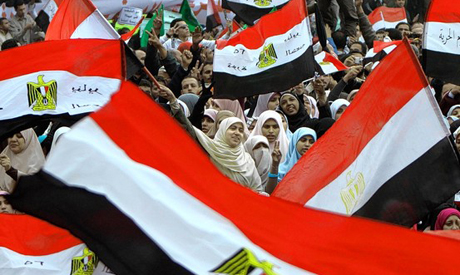 The seeming honeymoon between the Muslim Brotherhood, Egypt’s most formidable political faction, and the ruling Supreme Council of the Armed Forces (SCAF) appears to be ending – or at least experiencing some turbulence. Recent statements issued by the two groups reveal mounting tension, the extent of which remains unclear.
The seeming honeymoon between the Muslim Brotherhood, Egypt’s most formidable political faction, and the ruling Supreme Council of the Armed Forces (SCAF) appears to be ending – or at least experiencing some turbulence. Recent statements issued by the two groups reveal mounting tension, the extent of which remains unclear.
Brotherhood and military rulers trade barbs, threats
By-Ahram
Copts and Poliltical Islam
00:03
Wednesday ,28 March 2012

On Sunday, former Muslim Brotherhood spokesman Kamal El-Halabawi warned that if the Brotherhood continued levelling accusations against the SCAF it could lead the military to turn on the group. In a televised interview, he expressed his concern that the military was capable of bringing legal charges against Brotherhood members.
El-Halabawi’s statements followed an unexpected exchange of accusations and threats between the Brotherhood and the ruling military council.
In a statement on Sunday, the SCAF appeared to directly threaten the group and its leadership. "We ask everyone to be aware of the lessons of history so as to avoid mistakes from a past that we don't want to return to," the statement read.
This was widely interpreted as a reference to 1954, when a brief honeymoon between late president Gamal Abdel-Nasser’s Revolutionary Command Council and the Brotherhood ended in a far-reaching crackdown on the latter.
The SCAF’s warning came in response to a Brotherhood statement condemning what it described as "threats" to Parliament's constitutional legitimacy. The Islamist group, which controls the largest number of seats in Parliament, believes the Constitutional Court must be independent of other governmental authorities.
Egypt's Constitutional Court is currently examining the constitutionality of Egypt's newly-elected parliament, almost half of which is controlled by the Brotherhood, due to concerns that the elections law favoured political parties over independent candidates. The constitutionality of the law came into doubt after it was changed, following pressure from the Brotherhood, to allow party members to contest 50 per cent of the seats reserved for individual candidacies.
"It's unacceptable to threaten to challenge Parliament's constitutional legitimacy and imply that the Constitutional Court is subject to the executive authority," the SCAF stated.
The Brotherhood’s Saturday statement also raised the possibility that upcoming presidential elections might be rigged.
As the Brotherhood had been exerting pressure on the SCAF to replace the current government of Prime Minister Kamal El-Ganzouri, its statement asked aloud whether the current government was being kept in place simply to "abort the revolution or orchestrate upcoming presidential elections."
Through its parliamentary majority, the Brotherhood has frequently demanded that confidence be withdrawn from the government, only to have its demands repeatedly overruled by the SCAF.
The exchange of accusations came as a surprise, considering the relatively good relations the Brotherhood has maintained with the SCAF over the past year. The Brotherhood had frequently turned its back on its revolutionary allies to back SCAF policies.
It repeatedly attacked revolutionaries who called for one mass protest after another to press for the fulfilment of revolutionary demands. It even remained tight-lipped on the contentious issue of military trials for civilians, opening itself up to charges that it was "betraying the revolution."
The only major conflict that had arisen between the two sides had been linked to the SCAF’s attempts to force "supra-constitutional principles" on the constituent assembly – tasked with drafting a new constitution – back in November. Now that the constituent assembly has been drawn up – and is largely dominated by Brotherhood loyalists with no supra-constitutional principles in force – the group has raised alarm bells that its recent gains might be lost.
Moreover, earlier talk of finding a "consensus president" endorsed by both the Brotherhood and the SCAF has not materialised, with the Brotherhood still struggling to find a suitable candidate to throw its weight behind. While the Brotherhood had previously vowed not to field a candidate from within the group, it stated on Sunday that it was now reconsidering this policy as no suitable candidates had yet presented themselves .
It is obvious that tensions are mounting between the two powers, although precise reasons for this tension remain uncertain. What is clear, however, is that many of Egypt's anti-SCAF revolutionary groups that might have earlier backed the Brotherhood are now reluctant to do so, since the group has lost considerable popularity during its honeymoon phase with its military rival.
Some groups, such as the "Free Front for Peaceful Change," have gone so far as to question the genuineness of the current dispute, suggesting the possibility that it is merely an attempt to distract attention from the Brotherhood’s current domination of the constituent assembly and its marginalisation of other political factions.
Not only does the Brotherhood appear to be losing some of its political allies, but it may also be suffering internal divisions as a number of its members insist on backing former Brotherhood figure Abdel-Moneim Abul-Fotouh's presidential bid – a move that the organisation's leaders continue to reject.


